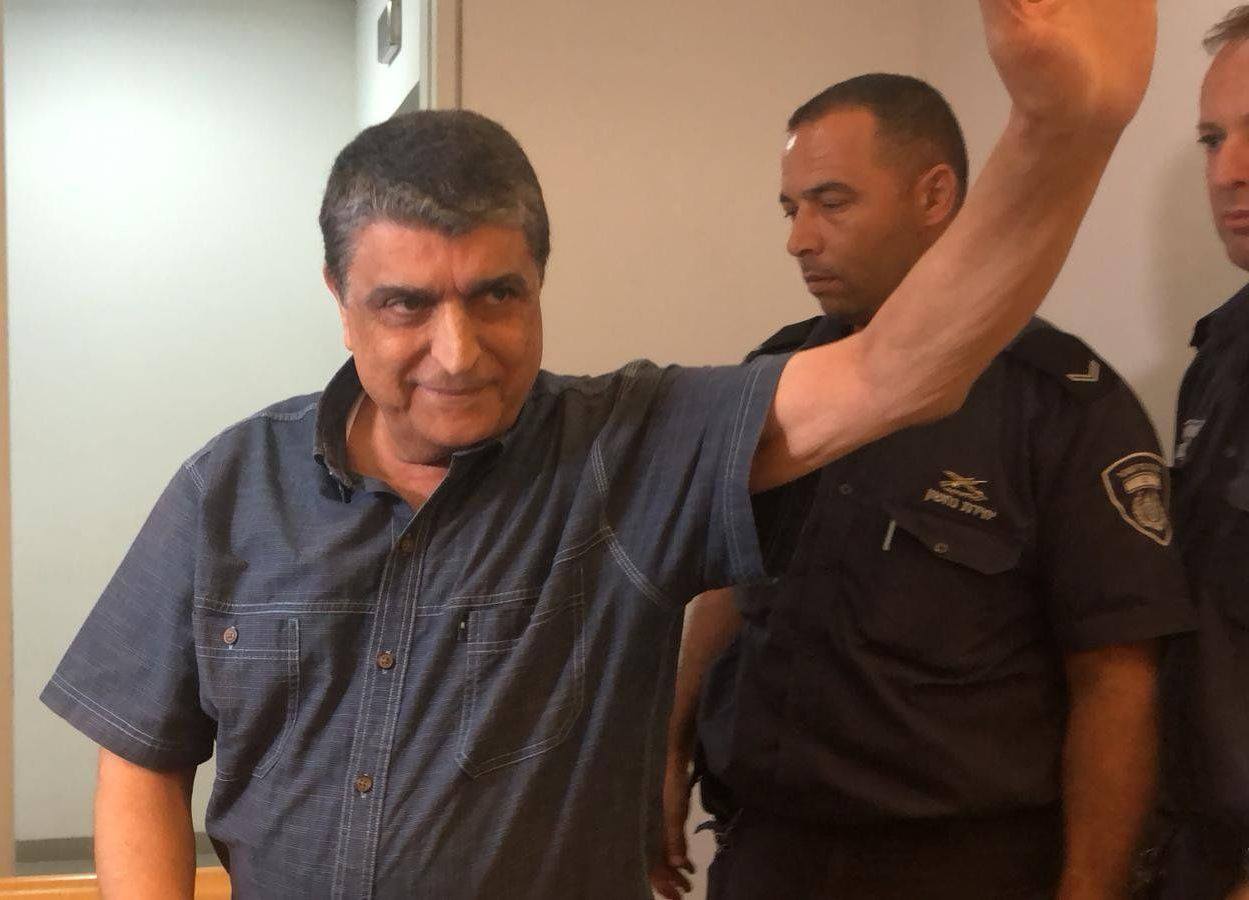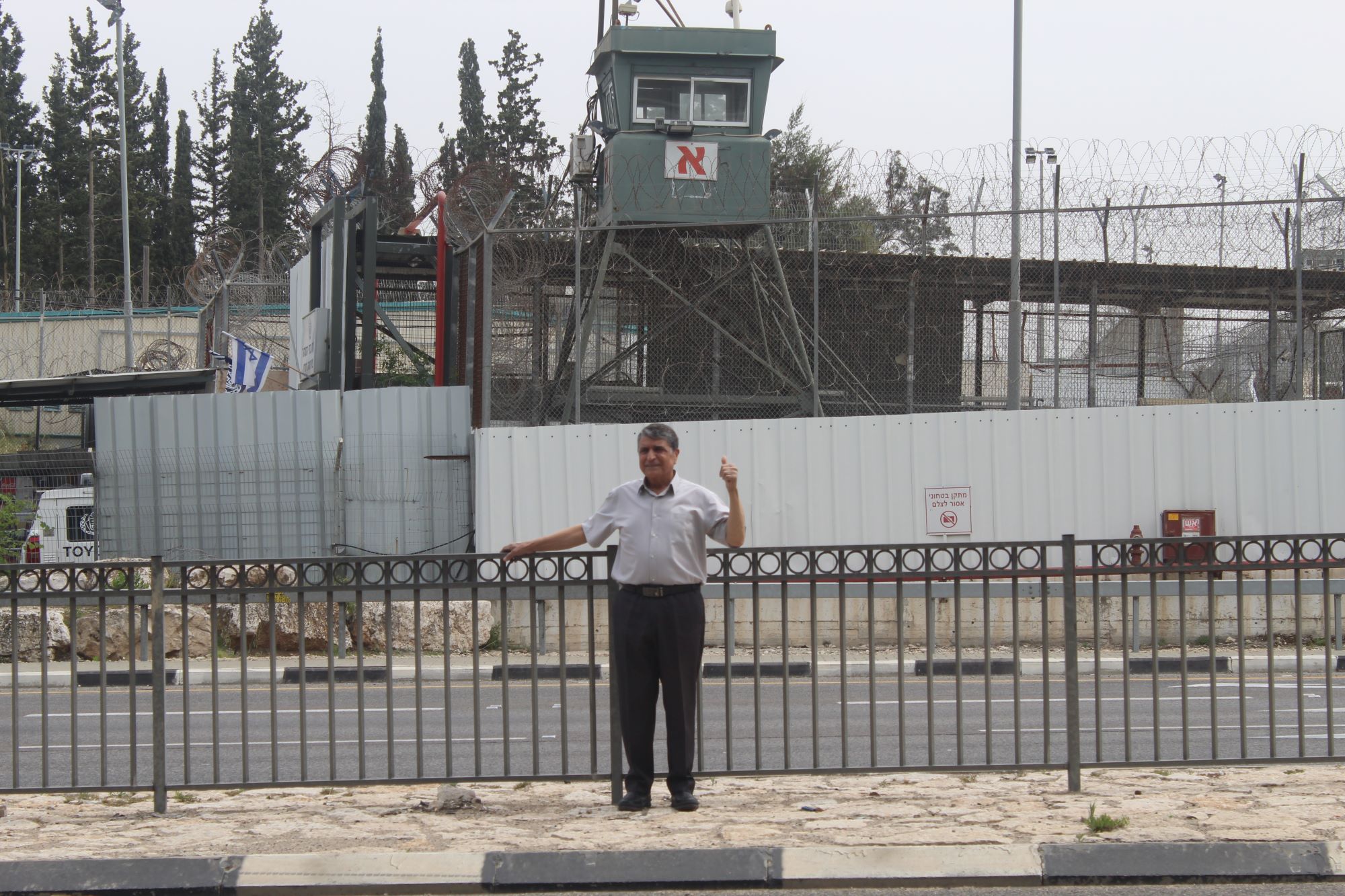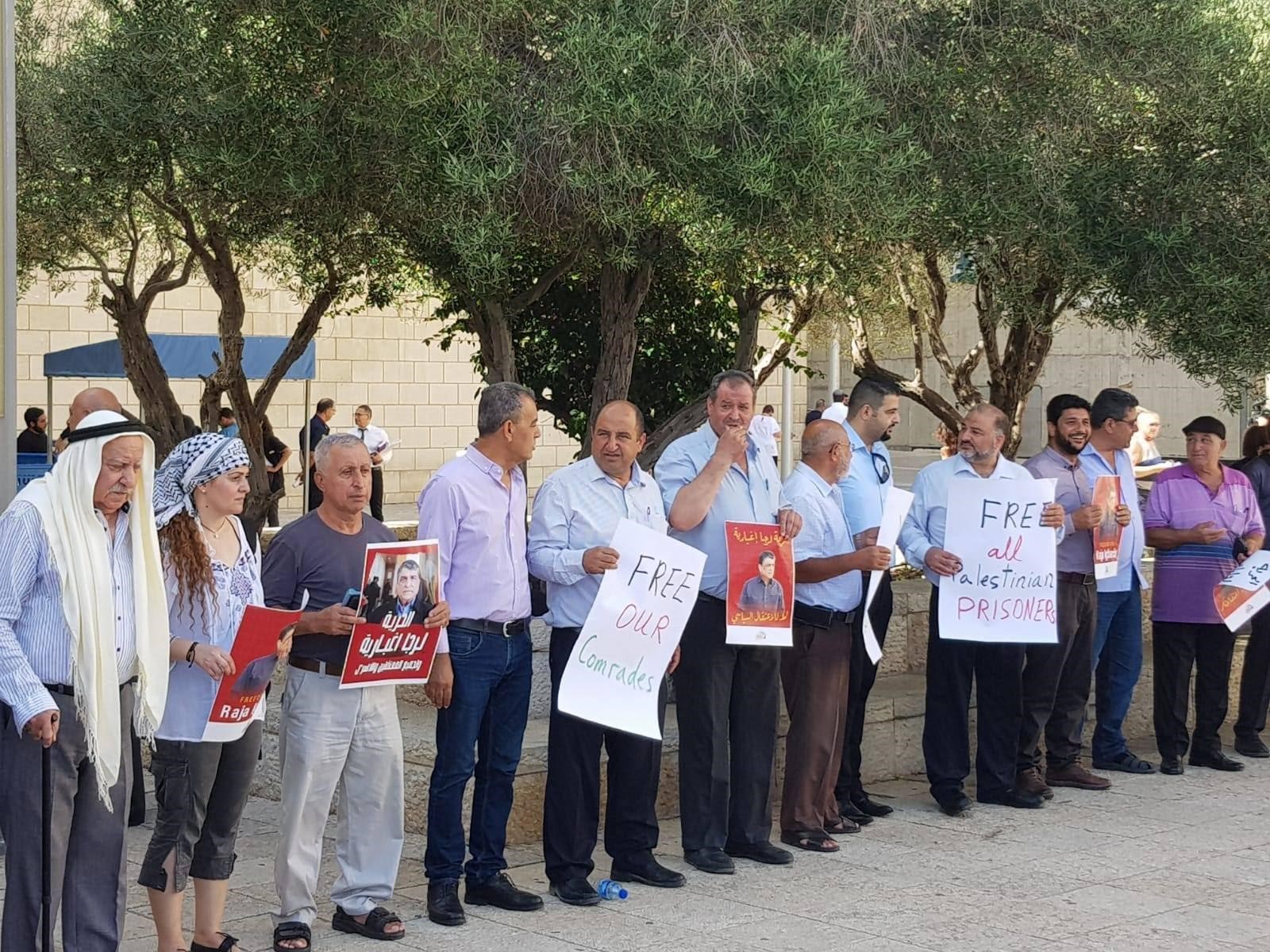From COVID lockdowns to house arrests, Raja Eghbaria has spent much of the last three years confined to his home in the northern city of Umm al-Fahm. He also happened to be home last month when he heard the news that Israeli Defense Minister Benny Gantz had classified six Palestinian civil society groups as “terrorist organizations.” The 69-year-old Eghbaria — a former member of the High Follow-Up Committee for Palestinian Arab citizens of Israel, and a former secretary-general of the secular nationalist movement Abnaa al-Balad — is in the midst of a trial based on the same accusations.
Since he began his political activity in the 1970s, Eghbaria has been under constant surveillance by Israeli authorities, detained dozens of times, and has spent several years in jail or under house arrest. Israel, however, only filed its first indictment against Eghbaria in 2018, charging him with “incitement to terrorism” and “identification with terror organizations” (the PFLP) in 10 Facebook posts. He has yet to be convicted.
“As somebody who was tried by administrative detention and was never prosecuted after 50 years of activism, and as somebody who had two newspapers shut down with the same false claim of association with the PFLP, I know well the injustice that the racist Zionist state of occupation and settlement is causing these institutions,” he said bluntly.
Israel’s Defense Ministry claimed that the six NGOs it blacklisted last month served as a “major source of funding” for the PFLP and worked “to support its activities and advance its goals,” though reports revealed that a key document submitted to the United States and European states failed to substantiate the allegations. Eghbaria’s history of activism, and Israel’s responses, reveal that such dubious allegations are nothing new: they have long been a staple of Israel’s repertoire for silencing dissent on both sides of the Green Line, and they are only becoming bolder.
‘It’s all political’
On a sleepy Ramadan afternoon in Umm al-Fahm in April, Eghbaria pulled up in a light blue, beat-up Toyota Corolla. His tucked-in, white shirt made him look like he was still practicing his old profession as a teacher, though he retired a long time ago after several detentions by Israel. “I was formally a teacher for 24 years, but I only practiced for around 10 years,” he said.
After scrambling between languages, he insisted on Hebrew. He didn’t want to be misrepresented, saying that misunderstandings have been the crux of Israel’s accusations against him for years. “In the court, they’re arguing about what I meant, not what I did,” he explained.
In one of the first hearings of his trial, the detective, the judge, the defendant, and his legal representatives were all Arabic speakers, but the court was forced to deal with the official evidence — Hebrew translations of the Arabic posts — with most of those present privy to the gulf in their meanings. “They were arguing about the Hebrew translation in Hebrew, but then shouting at each other in Arabic,” Eghbaria recalled.
One post on the charge sheet related to three men from Umm al-Fahm who killed two Israeli Border Police in Jerusalem in 2017. The army subsequently imposed a lockdown on Umm al-Fahm. When it was lifted, Eghbaria wrote on Facebook that the community could now express their “condolences” to the families. The court translated “taqdim wajb aleaza‘,” meaning to “pay condolences,” as to “identify with.” The court later conceded the translation was incorrect.
“If they want to detain people for posts like that, they would need to arrest 70 percent of the community,” Eghbaria quipped. He rejects violence, proclaiming he “never so much as hit an officer;” in court, he says “Baruch Hashem” (“thank God”) that his Facebook posts never led to any violence. “It’s all political,” he barbs.
With Ramadan restricting the options, Eghbaria took us to a café near the kibbutz of Megiddo, built on the ruins of the Palestinian village of Lajjun, whose residents were expelled by Israeli forces in 1948. Most of its residents ended up in Umm al-Fahm. The area is prosaic; on the other side of a monochrome carpark, a McDonalds crawling with navy officers. A high-security prison, where Eghbaria did his latest stint of jail time in 2018 alongside many Palestinian prisoners from the occupied West Bank, lingers in the vista.
“You can see my house from the prison,” he said with a strange pride. Megiddo, however, is infused with eschatological significance: according to the Book of Revelations, it is the arena for humanity’s final battle, and the word “Armageddon” actually derives from the Hebrew “Har Megiddo” (The Hill of Meggido). Eghbaria’s situation never had the grandeur or finality of the end days, but straddled the thin line between tragedy and farce. He personally opts for the word “absurd.”
A series of unwanted firsts
Eghbaria was born in 1952 to a farming family in Umm al-Fahm who owned “hundreds of dunams” before Israel’s establishment. After the state expropriated most of their lands during military rule, his father turned to construction work for a livelihood. His family, he said, were “patriotic but not political.”
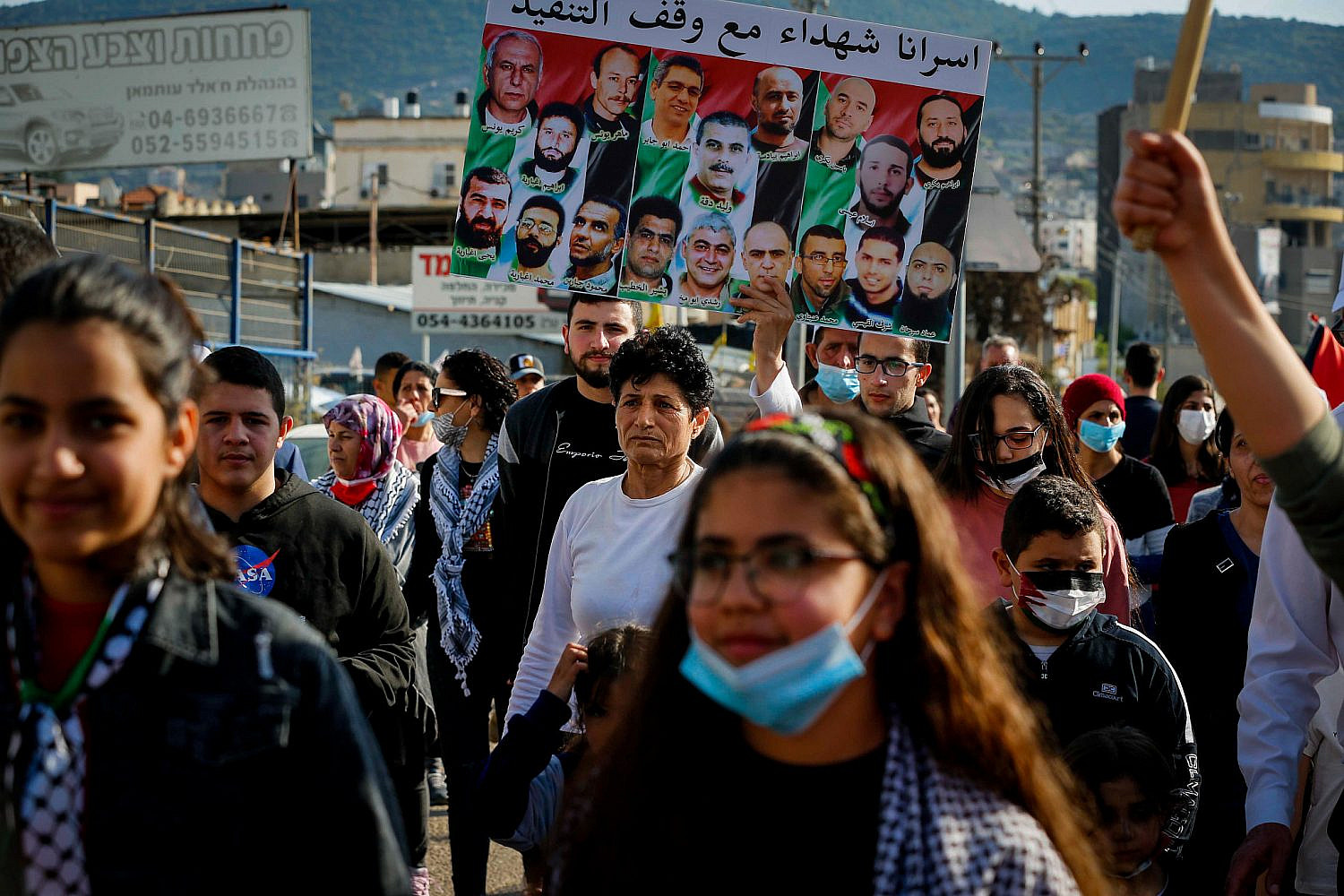
It was in Nazareth, where Eghbaria would live and study in the absence of a high school in Umm al-Fahm, that his political education began. One of his housemates was a university student who met Palestinians planning the incipient Palestine Liberation Organization (PLO) in prison in Jordan, and who became one of the founders of the Abnaa al-Balad (“Sons/Children of the Land”) movement. “They taught him politics, and everything he learned he passed on to me,” Eghbaria said.
After years of organizing Palestinian students in Israel, Eghbaria proudly claimed that his organization was among the first to openly raise the Palestinian national flag in Israel since its founding. It was March 30, 1976, the first Land Day, a nationwide strike among Palestinian citizens against Israel’s plans to expropriate Arab-owned land in the Galilee.
Eghbaria would go on to secure a series of less desirable firsts.
His participation in Land Day was one of his first run-ins with the authorities, but he got away with a stern warning. The next year, he wasn’t so lucky. “They accused me of receiving instructions from George Habash [founder of the PFLP] to start an intifada in Israel, but I never even had any contact with him,” he stated. At the time, Israel had more cause for concern with the PFLP, which had carried out high-profile plane hijackings and armed attacks. No evidence was presented linking Eghbaria to the group, but he was sentenced nonetheless to 25 days in solitary confinement under emergency regulations inherited by Israel from the British Mandate. The police, he says, even apologized to him after the ordeal.
In 1987, Eghbaria became the first Palestinian citizen of Israel to be imprisoned by administrative detention order and spent four months in prison. According to Eghbaria, eleven others were also detained for half a year. Previous administrative detention orders were limited to house arrests, and had forced Eghbaria to spend an approximate total of four years between 1980 and 1986 confined in his own home.
Israel uses administrative detention to indefinitely detain Palestinians (and very occasionally Jews) without charge or trial. The orders are reviewed every six months, but the detainees are not told what crimes they are accused of, nor shown the evidence against them. As a result, it is virtually impossible to defend oneself against an administrative detention order.
In many of Eghbaria’s contemporaries’ cases, where there was clear evidence of incitement or contact with or membership of banned Palestinian groups, Israel did not hesitate to use the full force of its legal system to prosecute them. Administrative detention, on the other hand, depends on the whims of the security services, with little to no recourse for objection. “If they had any evidence, they would’ve prosecuted me instead of putting me in administrative detention,” he added matter-of-factly.
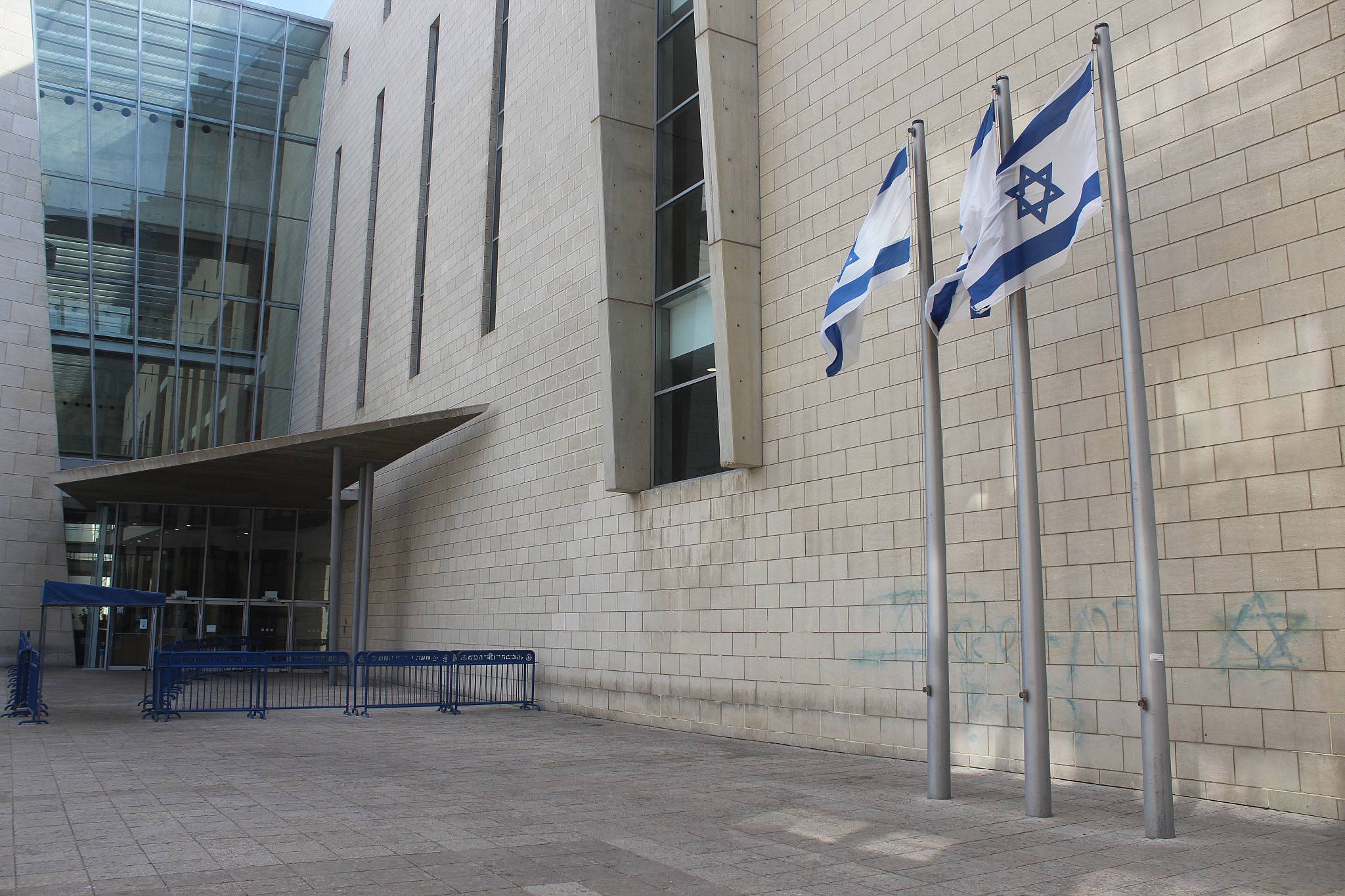
In this case, even the court told the defense establishment that “every effort should be made to prioritize proceedings such as a police investigation and the filing of indictments,” but no such efforts were made. Although the rejection of the appeal acknowledged that Abnaa al-Balad was not outlawed, it noted Eghbaria’s position in the movement, which it described as “identifying with the principles of George Habash’s Popular Front [PFLP].”
During his administrative detention, Eghbaria was paid a visit by a representative of the Education Ministry, who fired him for his political activity, launching a decade-long lawsuit which set a precedent on political activities of public workers. Eghbaria says that the lawsuit failed, but the victory only went so far. The Education Ministry, fearing that he would influence Palestinian teachers and students, took a roundabout route to buck his activities: they transferred him to a pedagogical institution in Hadera, working with Jewish students instead.
Over the course of his case against the Education Ministry, Eghbaria was forced to fight a battle on another front. His Arabic newspaper, Al-Raya, was officially registered with Israel’s military censor (as required by all media outlets in the country) from 1987 for a year and a half, yet was shut down by an administrative order alleging that the paper received funding from the PFLP. At the end of the same year, Eghbaria established another newspaper, Al-Midan, which lasted a similar length of time before it was also banned. The whole of Al-Raya covered 48 pages a week for a year and a half, yet the court found no evidence of incitement.
“It was a total waste of time,” Eghbaria said. “I had to send every word that was written to the censor before it got published anyway.” +972 asked the IDF censor to confirm this, but it was “unable to locate the requested material.”
A decade later, marking Land Day, Eghbaria appeared on the Israeli primetime political show, “Popolitika,” where he told his Jewish co-panelists that “your Independence Day is our Nakba Day.” This time around, he could no longer be fired, so the school simply stopped giving him assignments. Eghbaria described how he used to go into the school building, drink a cup of tea, and then return home. After the ministry rejected his request to move back to a school in an Arab locality, he no longer had the will to fight: he accepted a reduced pension and moved on.
Deterred, delegitimized, and drained
When Eghbaria was indicted for the first time in 2018, he realized that he had barely seen the inside of a courtroom. Before he had even found his way there, Eghbaria spent a month in detention and was then released to house arrest. There he was forbidden from using his phone or the internet, and prohibited from talking to the press. He was also required to post a NIS 10,000 bond (around $3,000) and was released from house arrest on July 5, 2020.
While house arrest is not uncommon in criminal cases, the conditions and the length of time were uniquely stringent, posits Wesam Sharaf, one of Eghbaria’s attorneys, from the legal center and human rights group Adalah.
Eghbaria was one of the first Palestinian citizens of Israel to be charged under new anti-terror legislation passed two years earlier. After a successful appeal to remove classified evidence from the charge sheet, Eghbaria was shown a handful of posts on social media, many dating back years and preceding the passage of the new law. “I took full responsibility for them,” he said.
The Anti-Terror Law, which collated disparate legislation into a single bill, was justified by then-Justice Minister Ayelet Shaked by saying that “only with appropriate punishment and deterrence can it [terror] be defeated.”
Sharaf argued the law was not merely a formalization of the preceding bills from the British Mandate, but also “added offences such as incitement, membership of banned organizations, and other ‘free speech’ offenses.” The law allows Israel to hold a person for an initial arrest period of 35 days, and extends the length of time for barring access to a lawyer to 30 days — the same as Palestinians in the occupied West Bank — even though the appeal period is only 30 hours. Sharaf adds that in the several cases Adalah has worked on, “most of the people targeted are public figures, politicians, and activists.”
In a sparsely-attended hearing in September, the prosecution referenced Eghbaria’s “influence” as a public figure — he has 5,000 friends and 1,600 followers on Facebook — as a key talking point. The hearing consisted of just 12 people, and the prosecutor was discomfited by the unexpected presence of the press. Eghbaria acerbically told the court that he wished he had half the influence the prosecution had claimed.
Adi Mansour, who works on the Anti-Terror Law for Adalah’s civil and political rights unit, said that the charges against both Eghbaria and the six Palestinian civil society groups testify to the “continued persecution of the political and civil leaders of the Palestinian people, on both sides of the border.” The law, he added, gave teeth to the attack on Palestinian dissent. Israel had already banned the northern branch of the Islamic Movement in 2015, resulting in interrogations and office raids, but it was only after the new legislation was passed that the authorities actually prosecuted its leadership.
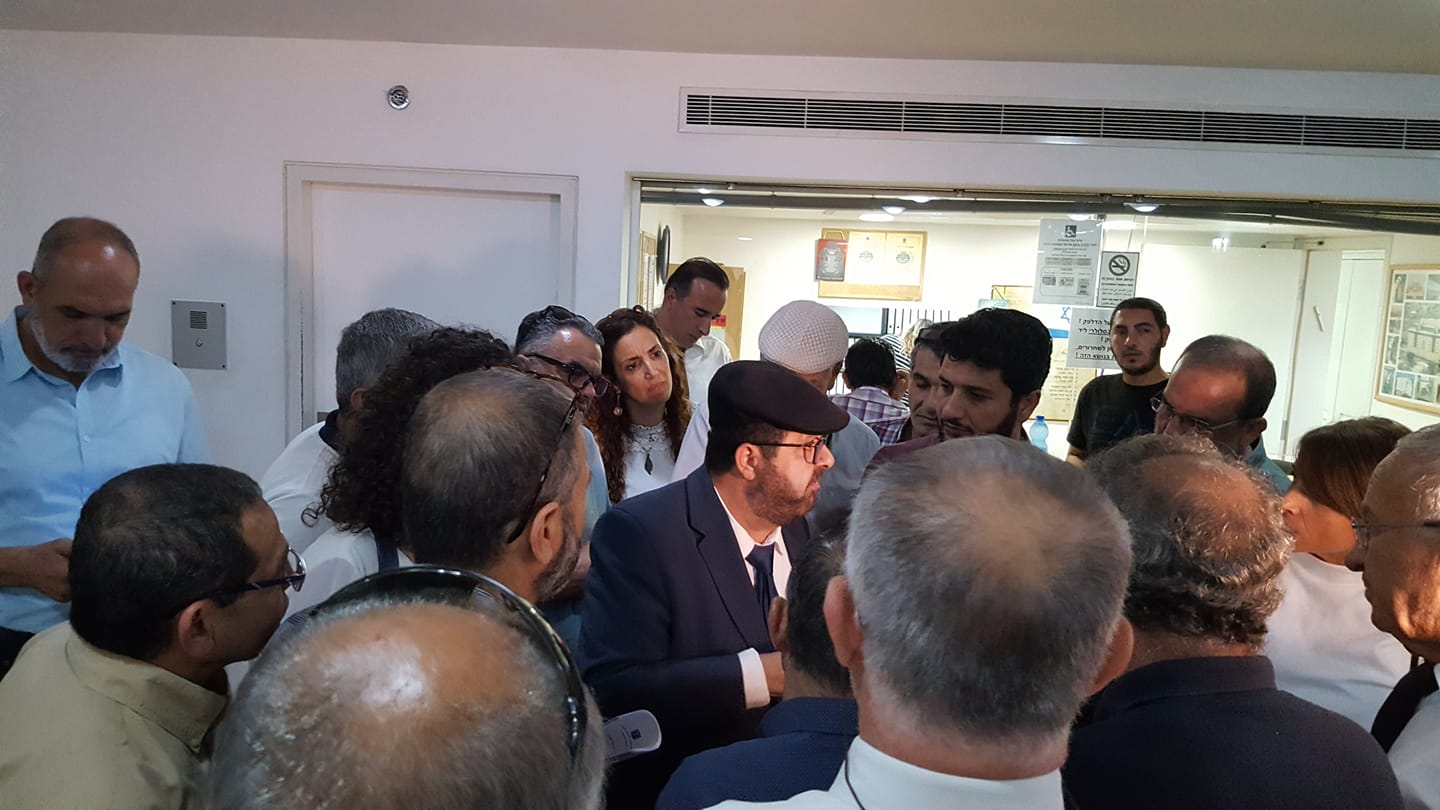
The Anti-Terror Law is currently being used against Sheikh Kamal Khatib, the deputy leader of the northern Islamic Movement, on the grounds that he was inciting violence during the unrest inside Israel in May. Although Khatib was released on temporary restrictive conditions before his upcoming trial, such as bans on attending mass gatherings and speaking to the press, he was held for a month in custody in the interim. This was despite the fact a video circulated of him telling the mosque congregation that if he was there when an elderly Jewish man was attacked in his community, he would personally have come to his aid. Israel has so far rejected Adalah’s freedom of information requests on the law.
The sprawling 76-page legislation leaves Palestinians in a “state of uncertainty,” Mansour said. “We are not sure if writing a post or attending a demonstration is right or wrong anymore… it deters Palestinians from engaging in political activity,” he added.
Hassan Jabareen, Adalah’s general director and a member of Eghbaria’s defense team, connects the bill to a broader crackdown on Palestinian citizens of Israel, dubbed by the police as “Operation Law and Order,” during and following the war in Gaza this year. In the Israeli police commissioner’s own words, the purpose of the operation was to “restore deterrence and increase governance.”
The police operation, Jabareen said, was “not based in criminal law. If they had evidence, they could’ve used a normal arrest warrant.” According to police statistics, 2,142 arrests were made and 184 people indicted. “The number of indictments relative to the arrests proves the campaign was unjustified,” argued Jabareen, adding that most people were released within a day.
Speaking to +972 in a personal capacity, Michael Sfard, a human rights attorney who is representing one of the accused NGOs, Al-Haq, traces the genealogy of the decision to the now-defunct Strategic Affairs Ministry and its long-running campaign against “delegitimization” of Israel, referring primarily to the BDS movement and war crimes cases brought to the ICC. The aim, Sfard said, was to persuade donor states that Palestinian NGOs are linked to terror groups in order “suffocate” their funding. “The failure to convince those governments has brought about this designation, which is motivated by the political work of these organizations,” Sfard explained.
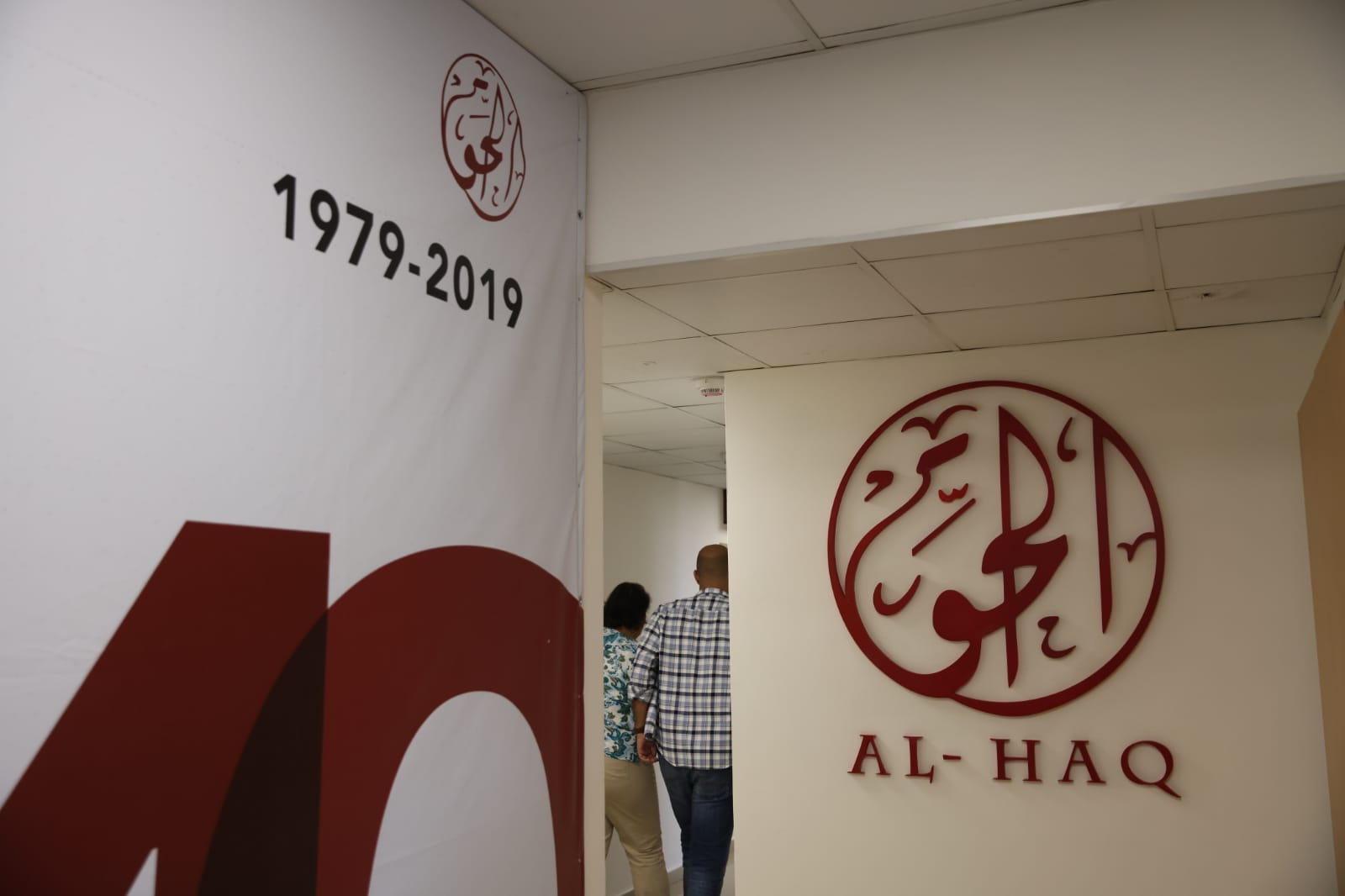
While Israel could directly block transactions to the NGOs’ accounts, the purpose, Sfard argued, is to delegitimize the Palestinian NGOs and “to convince European donors countries to stop donating to these organizations.” Already by November 5, a Finnish Christian group was the first to bow to the pressure to drop funding for Defense of Children International-Palestine.
Beyond the deterrence and delegitimization, the personal attacks and drawn-out trials also serve to wear down Palestinians. In his most recent hearing in September, marking almost three years since the legal proceedings against him began, Eghbaria grew increasingly rambunctious and uncooperative in the court; the prosecutor, and even the judge, seemed to be losing their patience.
On one hand, Eghbaria did not equivocate about his beliefs: he is fighting for “historic Palestine,” he said from behind the glass panel. “Make sure you write that,” he ordered the transcriber. On the other hand, Eghbaria joked, with a grimace pulled down by the gravity of the situation, that he was tired. His next hearing is slated for December 8, 2021, and it, too, is unlikely to provide him a resolution.
Correction: This article has been amended to reflect the fact that it was Eghbaria’s organization, not him individually, that first raised the Palestinian flag inside Israel. The article previously claimed that the Education Ministry had Eghbaria transferred to a cultural institution in Hadera, when in fact he was transferred to a pedagogical institution.

